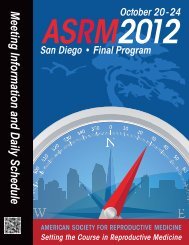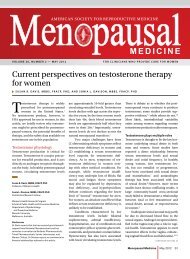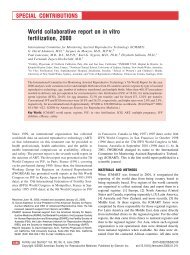scientific program • symposia - American Society for Reproductive ...
scientific program • symposia - American Society for Reproductive ...
scientific program • symposia - American Society for Reproductive ...
Create successful ePaper yourself
Turn your PDF publications into a flip-book with our unique Google optimized e-Paper software.
SCIENTIFIC PROGRAM <strong>•</strong> INTERACTIVE SESSIONS<br />
Tuesday, October 18, 2011 1:15 pm – 2:15 pm<br />
Interactive Session<br />
SHOULD CHROMOSOME TESTING OF THE PRODUCTS<br />
OF CONCEPTION BE ROUTINELY PERFORMED AT THE TIME<br />
OF THE SECOND MISCARRIAGE?<br />
Presented by the <strong>Reproductive</strong> Immunology Special Interest Group and<br />
the <strong>Society</strong> <strong>for</strong> <strong>Reproductive</strong> Endocrinology and Infertility<br />
Ruth B. Lathi, M.D. (Chair)<br />
Stan<strong>for</strong>d University<br />
Mary Stephenson, M.D., M.Sc.<br />
University of Chicago<br />
Lee R. Hickock, M.D.<br />
University of Washington<br />
Needs Assessment and Description<br />
Miscarriage is one of the most common complications of a<br />
pregnancy. Patients with a history of 2 or more miscarriages<br />
are at increased risk <strong>for</strong> recurrence, and often an evaluation<br />
is recommended at this point. Numeric chromosomal<br />
abnormalities account <strong>for</strong> over half of all miscarriages, yet<br />
testing miscarriages <strong>for</strong> chromosomal errors is rarely done.<br />
INFORMED CONSENT: THE ROLE OF THE REI NURSE<br />
Joint session presented by the Nurses’ Professional Group and the Legal<br />
Professional Group<br />
Margaret Swain, R.N., J.D. (Chair)<br />
Private Practice<br />
Maria M. Jackson, R.N., B.S., M.A.<br />
St. Barnabas Medical Center<br />
Needs Assessment and Description<br />
Within the context of the law, the doctrine of in<strong>for</strong>med<br />
consent reflects the legal concepts and statutory mandates<br />
governing interactions of medical providers with their<br />
patients during the in<strong>for</strong>med consent process. After<br />
reviewing the historical and conceptual aspects of this area,<br />
discussion will focus on the applied concept of in<strong>for</strong>med<br />
consent within ART nursing practice. A recent survey of<br />
ASRM members indicated an interest in this subject.<br />
Learning Objectives<br />
At the conclusion of this session, participants should be able<br />
to:<br />
1. Discuss the development and purpose of the doctrine of<br />
in<strong>for</strong>med consent.<br />
2. Identify proper content and delivery of the in<strong>for</strong>med<br />
consent discussion in ART.<br />
3. Define the role of the professional nurse in the ART<br />
in<strong>for</strong>med consent process.<br />
Room 230 D<br />
88<br />
Learning Objectives<br />
At the conclusion of this session, participants should be able<br />
to:<br />
1. Describe benefits of testing miscarriage tissue <strong>for</strong><br />
chromosomes.<br />
2. Identify costs, barriers and limitations of cytogenetic<br />
testing of products of conception.<br />
3. Discuss the impact on clinical management of patients<br />
with a history of 2 or more miscarriages.<br />
ACGME COMPETENCY<br />
Medical Knowledge<br />
Patient Care<br />
TEST QUESTION:<br />
For patients experiencing a miscarriage, after participating<br />
in this session, in my practice I will do chromosomal testing<br />
on products of conception:<br />
A. For every miscarriage.<br />
B. For the second (or higher number) miscarriage.<br />
C. Only if the loss occurs after 8 gestational weeks.<br />
D. Only by patient request.<br />
E. Not applicable to my area of practice.<br />
Tuesday, October 18, 2011 1:15 pm – 2:15 pm<br />
Interactive Session<br />
Room 230 C<br />
ACGME COMPETENCY<br />
Patient Care<br />
Interpersonal and Communication Skills<br />
TEST QUESTION:<br />
After participating in this session, I will do the following in my<br />
practice:<br />
A. Not use an in<strong>for</strong>med consent document.<br />
B. Use a facility-provided general consent <strong>for</strong>m.<br />
C. Provide the in<strong>for</strong>med consent document to patients <strong>for</strong><br />
their review prior to their physician-conducted in<strong>for</strong>med<br />
consent discussion.<br />
D. Never encourage the patient to question the physician<br />
about a procedure, since the nurse is available to answer<br />
all questions.<br />
E. Not applicable to my area of practice.








